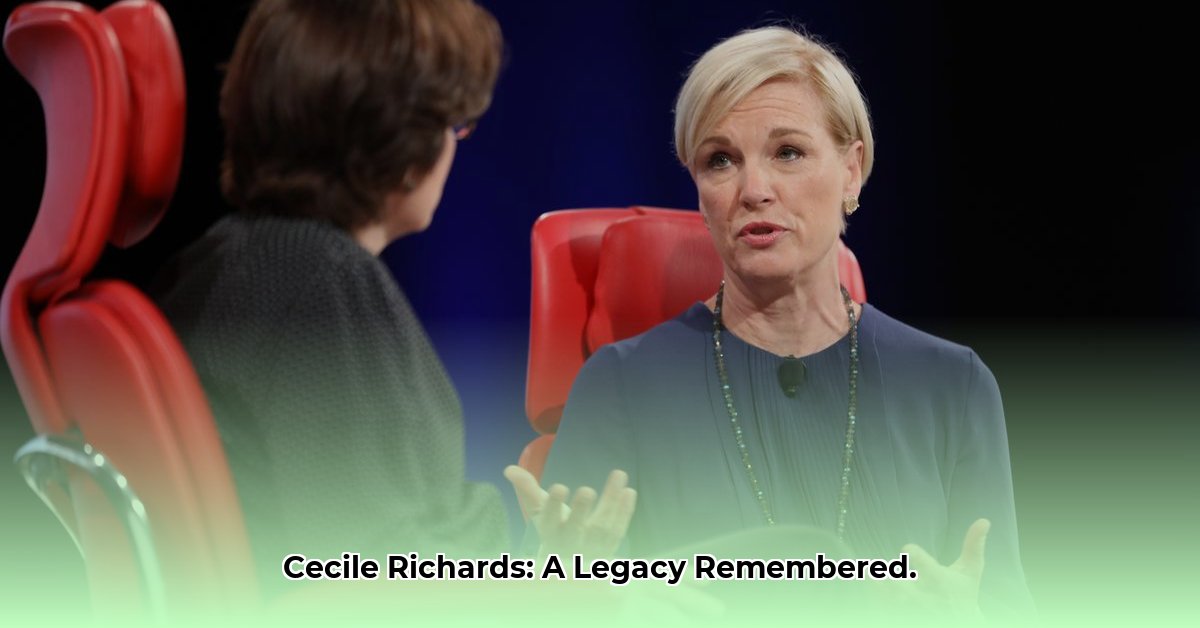A Champion’s Farewell: Remembering Cecile Richards
Cecile Richards, the formidable leader who helmed Planned Parenthood for twelve years, died on January 20, 2025, at age 67. Her cause of death was glioblastoma, an aggressive form of brain cancer. Richards, daughter of former Texas Governor Ann Richards, dedicated her life to advocating for women’s health and reproductive rights.
Early Life and Advocacy: A Foundation for Change
Growing up in the politically charged environment of her mother’s governorship, Cecile Richards developed a deep passion for social justice. Her father, David Richards, a prominent civil rights lawyer, further shaped her commitment to advocacy. This upbringing likely influenced her decision to support Sarah Weddington, the lawyer who argued Roe v. Wade, early in her career. Richards honed her organizing skills working on her mother’s campaigns and later as a labor organizer. These experiences provided invaluable groundwork for her future leadership roles. After graduating from Brown University in 1980 with a history degree, she dedicated her career to fighting for the rights of workers and underserved communities.
Leading Planned Parenthood Through Turbulent Times
In 2006, Richards became president of Planned Parenthood, stepping into a role that would define her legacy. Her twelve-year tenure was marked by both significant achievements and unprecedented challenges. She led the organization through a period of expansion, increasing access to vital reproductive healthcare services for countless individuals.
However, Richards also faced fierce opposition and controversy, particularly surrounding the issue of abortion. The 2015 undercover video scandal, though later debunked, put Planned Parenthood under intense scrutiny. Richards testified before Congress, defending the organization’s work and highlighting the importance of reproductive healthcare. This period likely strengthened her resolve and solidified her image as a fearless advocate. Throughout her presidency, she skillfully navigated the increasingly polarized political landscape surrounding reproductive rights, advocating for access to care amidst growing opposition.
Beyond Planned Parenthood: A Continued Fight for Equality
After leaving Planned Parenthood in 2018, Richards co-founded Supermajority, a political action group focused on mobilizing and empowering women. This suggests her ongoing commitment to broader issues of equality and justice. Her receipt of the Presidential Medal of Freedom in 2024 underscored her profound impact on American society.
A Timeline of Cecile Richards’s Life and Legacy
| Year | Milestone |
|---|---|
| 1957 | Born in Waco, Texas |
| 1980 | Graduated from Brown University |
| 2006 | Became President of Planned Parenthood |
| 2015 | Navigated the undercover video controversy |
| 2018 | Co-founded Supermajority |
| 2024 | Received the Presidential Medal of Freedom |
| 2025 | Died at age 67 |
The Future of Reproductive Rights: Carrying the Torch
Cecile Richards’s passing leaves a void in the fight for reproductive rights, but her legacy will undoubtedly inspire future generations of activists. The ongoing debate surrounding reproductive healthcare access in the United States underscores the importance of continued advocacy and vigilance. While the future remains uncertain, Richards’s life’s work suggests that with persistence, courage, and a collective voice, progress can be achieved.
Richards’s Impact: Achievements, Challenges, and Ongoing Debates
Richards’s leadership at Planned Parenthood resulted in significant growth and expansion of services. Her ability to connect with people and articulate the importance of reproductive healthcare likely contributed to increased membership and donations. However, her tenure was also marked by intense political opposition and controversy. The 2015 undercover video scandal, though later discredited, highlighted the vulnerability of organizations like Planned Parenthood to politically motivated attacks. This incident, along with ongoing legislative battles at both the state and federal levels, intensified the political divide surrounding reproductive rights. While Richards’s efforts may have broadened public understanding of these complex issues, the long-term effects of her advocacy and the ongoing debate about reproductive healthcare access remain subjects of ongoing analysis and research.
The Political Landscape: Navigating a Divided Nation
Richards led Planned Parenthood during a period of increasing political polarization surrounding reproductive rights. The organization became a frequent target for conservative lawmakers seeking to restrict abortion access. The 2015 undercover video controversy exemplified this trend, bringing intense scrutiny and renewed calls to defund Planned Parenthood. Despite these challenges, Richards remained a steadfast advocate for reproductive freedom, defending the organization’s work and highlighting the importance of women’s health. Her leadership during this turbulent period solidified her reputation as a courageous and determined leader. However, the ongoing debate about reproductive healthcare in the United States suggests that these political battles are far from over. Ongoing research and analysis will likely continue to examine the long-term impacts of these political battles and the role of leaders like Richards in shaping the future of reproductive rights.







